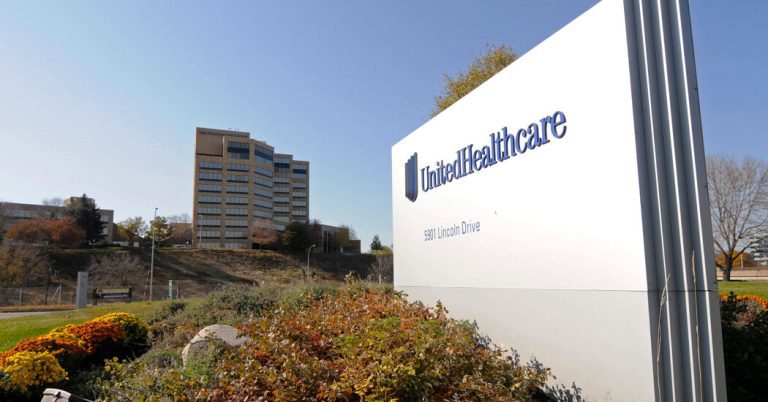UnitedHealth Group reported on Thursday that it earned less than expected this past quarter, citing higher medical costs and pressure on its insurance division at a time when the company is still reeling from the shock killing of a top executive last month.
Revenue for UnitedHealth Group came in at $100.8 billion for the fourth quarter, below analysts’ expectations but still up 6.8% from the same quarter a year earlier. The company’s full-year revenue for 2024 rose to $400.3 billion. For UnitedHealthcare, the insurance division, full-year revenue rose to $298.2 billion, up 6% from 2023.
The results were the company’s first since Brian Thompson, the chief executive of UnitedHealthcare, was gunned down outside a hotel in Midtown Manhattan.
The killing unleashed public outrage aimed at major health insurers over lack of access to health care and denial of coverage and insurance claims.
Some shareholders urged UnitedHealth to issue a report on its practices that “restrict or delay access to health care.”
Andrew Witty, chief executive officer of UnitedHealth Group, said on a call with analysts on Thursday that frustration with claims, including delays in getting care and coverage, were “key areas where we need to work hard to improve.”
The successor of Mr. Thompson has yet to be nominated. Mr. Witty did not share details about filling the position, nor did it directly address the recent shareholder campaign.
But he and other executives discussed the loss of Mr. Thompson at the top of the call.
“He gave his time to help make the health system work better for all the people we are privileged to serve,” said Mr. Witty.
UnitedHealth’s results, which disappointed Wall Street, in many ways reflected broader trends and lingering issues for the industry. For several quarters, US health insurers have had their profits hit by high medical costs and tightening government payment policies.
John Rex, the company’s chief financial officer, pointed to state rate cuts in the payment system for Medicare Advantage, the private insurance arm of federal coverage for people 65 and older. UnitedHealth has significant activity in these private Medicare plans.
Medicare Advantage’s performance has declined across the industry recently, in part because of regulatory changes aimed at preventing overbilling and after rising health costs in some aging populations.
Mr. Witty also said there were costs associated with changes to Medicaid, the federal government insurance program for the poor.
The company’s medical expense ratio, a measure of the cost of providing care, was higher than expected in the most recent quarter, which could fuel investor concerns that rising costs to provide care may be delayed, John said. Boylan, analyst. at Edward Jones, an investment firm.
UnitedHealth, however, kept its full-year 2025 guidance intact, unaffected by recent pressures. Morgan Stanley analysts said in a research note that the company had set “reasonably prudent targets” for this year.
“Overall, our view is that United is well-positioned to navigate the evolving healthcare landscape because of its diversified business model,” said Mr. Boylan.
UnitedHealth stock fell 6% on Thursday as investors digested weaker-than-expected results. UnitedHealth’s results, often seen as a drag on industry-wide performance, weighed on shares of rivals including CVS Health, which is the parent company of insurer Aetna.
UnitedHealth Group also owns Optum Rx, one of the nation’s largest pharmacy benefit managers, which is hired by employers and government programs to oversee prescription drug benefits.
Optum Rx has faced scrutiny from regulators over concerns that it raised drug prices, putting its own interests above those of patients, employers and taxpayers. Just this week, the Federal Trade Commission released a report detailing how PBMs could inflate drug costs.
The agency criticized Optum Rx and two other major benefit managers — CVS Health’s Caremark and Cigna’s Express Scripts — for raising prices on generic drugs for cancer, heart disease and other diseases by up to 1,000 percent of the national average cost.
Mr. Witty, the chief executive of UnitedHealth Group, defended Optum’s practices, noting that 98 percent of the discounts were passed on to customers. By 2028, he said, all discounts will be rolled over. Drug prices in the United States, argued Mr. Witty, they are “de novo very high compared to any other price in the world” and shifted the blame to pharmaceutical companies.
“The PBM acts on behalf of the ultimate payer — the employer, the union, the state,” said Mr. Witty to analysts.
Mr. Witty was not involved in Justice Department investigations or lawsuits seeking to block the proposed acquisition of Amedsys, a large home care and hospice company.
In addition to rising medical costs and increasing use of healthcare services, UnitedHealth executives pointed to a widespread ransomware attack in 2024 that weighed on the company’s full-year earnings. The cyberattack forced the shutdown of the company’s extensive billing and payment system, Change Healthcare. The company estimated that the data breach of health and privacy information affected more than 100 million people and said this week that its review of the personal information involved in the incident was “substantially complete.”
26-year-old Luigi Maggione has been charged with multiple state and federal counts of murder, as well as weapons pursuit offenses. He has pleaded not guilty.
UnitedHealth and police said neither he nor his parents had medical insurance through UnitedHealth.




